
Commercial kitchens are notorious for being high-risk environments, with slippery floors being a major hazard. These floors can lead to slips, falls, and other accidents that can cause injuries to staff and customers. To mitigate these risks, many commercial kitchen owners are turning to non-slip floor tiles as a solution. These tiles are specifically designed to provide traction and prevent slips, making them an ideal choice for commercial kitchens.
Choosing the right non-slip floor tiles for a commercial kitchen can be a daunting task, as there are many factors to consider. Factors such as durability, slip resistance, ease of cleaning, and cost all play a role in selecting the right tiles.
This article will explore the various types of non-slip floor tiles available for commercial kitchens, as well as important considerations to keep in mind when selecting and installing them. It will also provide some tips on how to make a commercial kitchen as safe as possible.
The implementation of new non-slip floor tiles in commercial kitchens can significantly enhance safety measures and decrease the risk of accidents caused by worn-out floors. Choosing appropriate materials for the floor tiles is crucial in ensuring that they meet safety standards for commercial kitchens. For instance, the tiles should be slip-resistant and non-porous to prevent slips, trips, and falls and avoid food and liquid absorption.
A cost-benefit analysis is necessary before replacing old floors with non-slip floor tiles. The analysis should take into account the initial cost of installation, maintenance costs, and the potential savings from reduced accidents and injuries. Additionally, compliance with safety regulations is essential, and non-slip floor tiles can help meet these requirements. Installing these tiles can also save the business from costly legal battles resulting from accidents caused by unsafe flooring.
It is crucial to provide employee training on the importance of maintaining the non-slip floor tiles. Proper maintenance techniques such as regular cleaning and inspection should be taught to employees to ensure the tiles remain in good condition. Failure to maintain the tiles correctly can result in a reduction in their effectiveness, increasing the risk of accidents.
Overall, implementing non-slip floor tiles in commercial kitchens can significantly improve safety and prevent accidents, while also complying with safety regulations and saving the business from potential legal battles.
When choosing non-slip floor tiles for a commercial kitchen, it is crucial to prioritize high-quality tiles. Look for tiles that are specifically designed for commercial kitchen environments, as they are more likely to meet the required safety standards. High-quality tiles are often made from durable materials such as porcelain or ceramic, which can withstand heavy foot traffic and resist wear and tear. They should also have a high slip resistance rating, ideally meeting or exceeding the recommended standards for commercial kitchens.
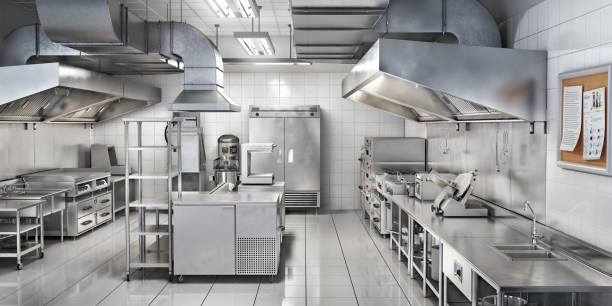
Antimicrobial and hygienic features are crucial considerations for creating a safe environment in food preparation areas. Non slip floor tiles that possess these properties provide numerous benefits that contribute to maintaining a clean and healthy workspace.
The following are some of the advantages of using antimicrobial and hygienic floor tiles:
- Antimicrobial benefits: These tiles are designed to resist bacteria growth and provide a barrier against harmful pathogens. They are effective in reducing the risk of cross-contamination and help maintain a sterile environment.
- Cleanliness advantages: Non slip tiles with hygienic properties are easy to clean and maintain, reducing the risk of dirt and grime buildup. This makes them ideal for use in commercial kitchens where cleanliness is crucial.
- Health benefits: The antimicrobial properties of these tiles help to create a healthier environment by reducing the risk of illnesses caused by bacteria and other pathogens. This is especially important in food preparation areas where the risk of contamination is high.
- Food safety benefits: Non slip floor tiles that are antimicrobial and hygienic help to ensure that food is safe for consumption. They prevent the spread of harmful bacteria and reduce the risk of foodborne illnesses.
- Hygienic properties: These tiles are designed to meet the highest standards of hygiene and cleanliness, making them ideal for use in commercial kitchens. They are resistant to stains and odors and provide a long-lasting and durable solution for food preparation areas.
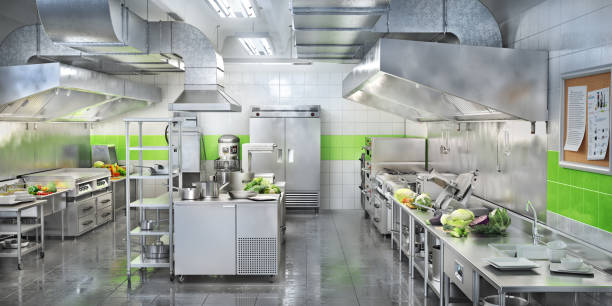
The longevity of a flooring material is an essential aspect to consider for any commercial kitchen, as it is subjected to constant wear and tear from heavy foot traffic, spills, and dropped utensils. A durable flooring material not only ensures that the workspace remains functional and efficient for an extended period but also provides a sense of security and reliability to the users. When it comes to non-slip floor tiles for commercial kitchens, long-term durability is a crucial factor to consider.
One way to assess the durability of a flooring material is to look at its resistance to various types of impact, wear, weather, and chemicals. A table outlining the resistance of different materials to these factors can help make an informed decision when choosing a suitable non-slip floor tile. In general, ceramic and porcelain tiles are considered to have high durability, while rubber and vinyl tiles offer better slip resistance and are more flexible, making them ideal for areas where heavy objects are frequently dropped. Ultimately, the choice of non-slip floor tile should depend on the specific needs of the commercial kitchen and the expected level of wear and tear it will experience.
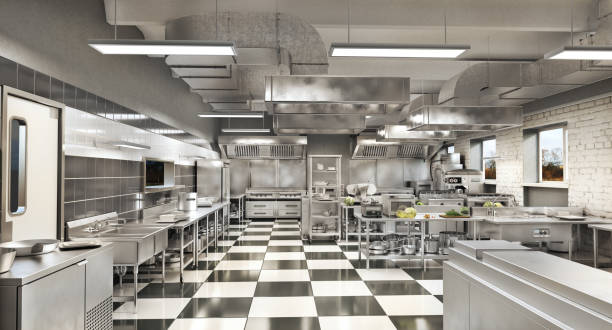
Comfort is an essential aspect to consider when selecting flooring material for a commercial kitchen, as it can affect the physical well-being and productivity of the workers.
The comfort benefits of non slip floor tiles for commercial kitchen are numerous and include an ergonomic design that reduces the stress and strain on the feet, legs, and back of the workers.
Since workers in a commercial kitchen spend long hours standing and moving around, the flooring material should be able to provide comfort and support to prevent fatigue and injury.
One way to enhance the comfort benefits of non slip floor tiles for commercial kitchen is to use anti-fatigue mats.
These mats are designed to reduce the pressure on the feet and legs by providing cushioning and support.
Anti-fatigue mats are made of materials like rubber, foam, or gel, which are shock-absorbing and offer a comfortable surface to stand on.
Additionally, workers in a commercial kitchen can also wear slip-resistant shoes that provide extra support and stability.
With their durable and impact-resistant design, non slip floor tiles for commercial kitchen can help improve the comfort and safety of workers, reducing the risk of accidents and injuries in the workplace.
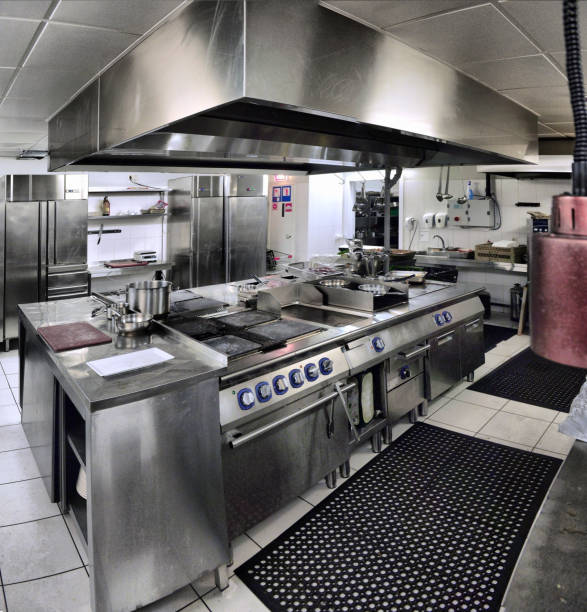
Effortless installation is a key feature to consider when choosing a flooring material for a busy commercial kitchen, allowing for minimal downtime and disruption to operations. Quick installation is crucial in maintaining the smooth functioning of the kitchen, especially during peak hours. Therefore, it is imperative to opt for non-slip floor tiles that offer DIY options or professional installation services that can be completed in a timely manner. The adhesive requirements of the tiles should also be taken into account, to ensure the installation process is efficient and hassle-free.
In addition to DIY options, time-saving techniques can also be employed to expedite the installation process. For example, some non-slip floor tiles come with interlocking mechanisms that remove the need for adhesives, allowing for quick and easy installation. Professional installation services can also provide an efficient installation process, as they have the necessary tools and expertise to complete the job effortlessly.
By considering these factors, commercial kitchens can select non-slip floor tiles that offer quick and easy installation, saving time and minimizing operational disruption.
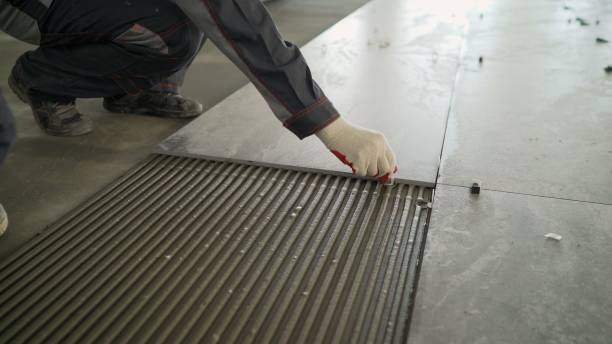
The last but not least important factor to consider is the ease of maintenance. In a busy commercial kitchen, spills and stains are inevitable, so it is essential to choose non-slip floor tiles that can be easily cleaned and maintained. Opt for tiles that have a smooth surface, as they are less likely to trap dirt and grease. Additionally, choose tiles that are resistant to chemicals and stains, as they will be exposed to various food and cleaning substances. Consider tiles that require minimal maintenance efforts, such as those that can be easily wiped clean or are resistant to discoloration and fading.
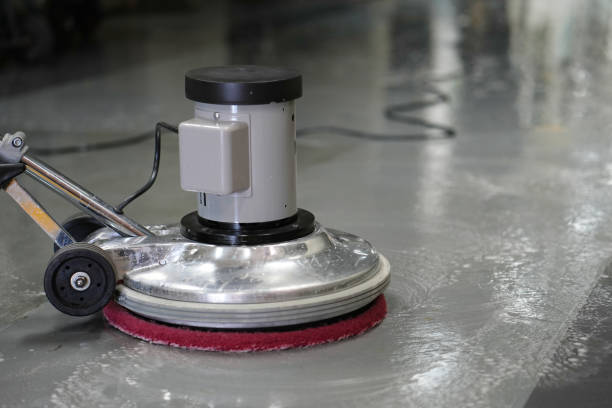
If you have already selected your non slip floor tiles for your commercial kitchen but are unsure if they meet all the criteria mentioned above, I recommend consulting directly with our professional team. Our team has extensive experience in this area and can assist you in optimizing your tile selection.
Ceramic tiles have long been a popular choice for commercial kitchen flooring due to their durability and resistance to moisture and high temperatures. Here are some of the benefits of using ceramic tiles for the flooring of your commercial kitchen:
-Durability: Ceramic tiles are known for their exceptional durability, making them an ideal choice for high-traffic areas like commercial kitchens. They are resistant to heavy foot traffic, impact, and scratches, ensuring that your flooring will remain intact and maintain its appearance for a long time.
-Water and Moisture Resistance: Commercial kitchens often involve water and liquid spills, which can lead to slippery surfaces and potential accidents. Ceramic tiles are water-resistant and can withstand moisture, reducing the risk of slips and falls. Additionally, their resistance to water prevents the growth of mold and mildew, maintaining a hygienic environment in the kitchen.
-Easy Maintenance: Ceramic tiles are relatively easy to clean and maintain. Their smooth, non-porous surface makes it difficult for dirt, stains, and bacteria to penetrate, allowing for quick and effortless cleaning. Regular sweeping, mopping, and occasional spot cleaning are usually sufficient to keep ceramic tiles looking clean and fresh.
-Heat Resistance: Commercial kitchens often involve high temperatures and hot equipment. Ceramic tiles have excellent heat resistance properties, making them suitable for areas near stoves, ovens, and other heat-emitting appliances. They can withstand extreme temperatures without warping or cracking, ensuring the longevity of your flooring.
-Hygiene: Maintaining a hygienic environment is crucial in a commercial kitchen. Ceramic tiles offer a hygienic flooring solution as they are resistant to bacteria, germs, and allergens. Their non-porous surface does not absorb liquids, food particles, or odors, making it easier to maintain cleanliness and prevent the growth of harmful microorganisms.
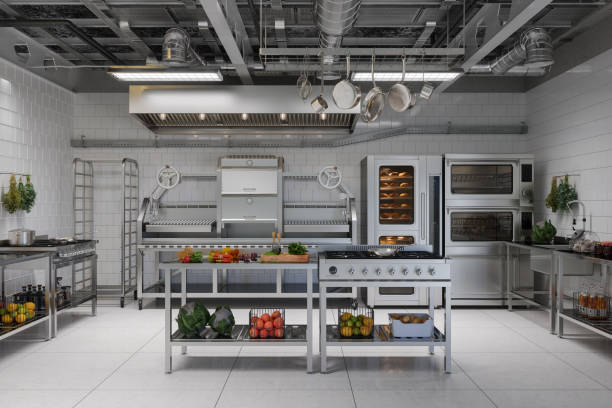
Concrete flooring is a popular choice for commercial kitchens due to its durability and resistance to heavy foot traffic, stains, and spills. However, there are also alternative materials available that can mimic the appearance of concrete while providing additional benefits.
For example, slip-resistant coatings can be applied to concrete flooring to improve safety in areas that are prone to wetness or grease buildup. Additionally, polished concrete can provide a sleek and modern look while also being easier to clean and maintain than traditional concrete.
When it comes to maintenance, concrete flooring requires regular cleaning and sealing to maintain its appearance and prevent damage. Sweeping or vacuuming daily and mopping with a mild detergent on a weekly basis can help prevent buildup of dirt and grime. Additionally, it is important to repair any cracks or chips in the concrete as soon as possible to prevent further damage.
In terms of cost, concrete flooring can be a more affordable option compared to other types of flooring, but the cost can vary depending on factors such as the size of the space and the complexity of the installation. Overall, concrete flooring can be a great choice for commercial kitchens, but it is important to consider all options and factors before making a decision.
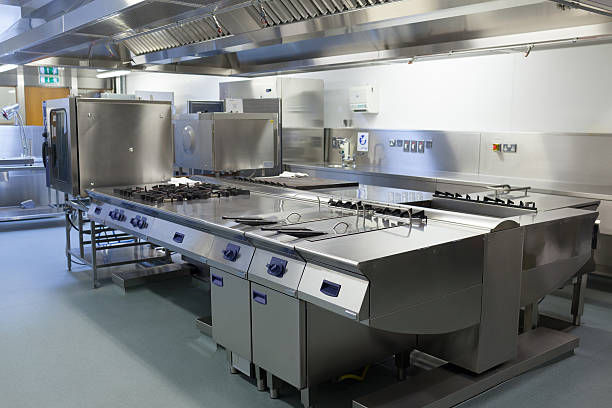
Natural stone tile flooring is a popular choice for many commercial spaces due to its natural beauty and durability. The benefits of natural stone flooring are numerous, including its unique and elegant appearance that can add value to any commercial kitchen.
Additionally, natural stone tiles are incredibly durable and long-lasting, making them a cost-effective option for commercial kitchens that experience high foot traffic.
There are several popular options for natural stone tile flooring, including marble, granite, and limestone. Each option has its unique characteristics, such as color, veining, and texture, giving commercial kitchen owners a wide range of design versatility to choose from.
Furthermore, natural stone tile flooring is relatively easy to maintain, requiring routine cleaning and sealing to maintain its appearance and durability. By following proper maintenance tips, commercial kitchen owners can ensure that their natural stone tile flooring remains beautiful and functional for years to come.
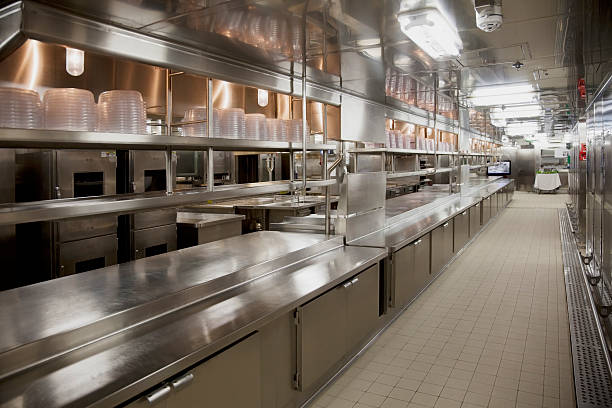
Commercial vinyl flooring is a popular choice for commercial kitchens due to its durability, slip resistance, and ease of maintenance. There are different types of commercial vinyl flooring options available, including:
Vinyl Sheet Flooring: This type of flooring is available in large rolls and is suitable for large commercial kitchens. It offers a seamless and easy-to-clean surface, making it resistant to spills and stains. It can also be heat-welded at the seams to provide additional moisture resistance.
Luxury Vinyl Tiles (LVT): LVT is a modern flooring option that mimics the appearance of natural materials like wood, stone, or ceramic tiles. It offers a wide range of design options and can be easily installed in commercial kitchens. LVT provides slip resistance and is highly durable, making it suitable for high-traffic areas.
Vinyl Composite Tiles (VCT): VCT is a cost-effective flooring option for commercial kitchens. It is made from a mixture of vinyl, fillers, and binders. VCT requires regular maintenance, including waxing and polishing, to maintain its appearance and durability. It offers good slip resistance and is suitable for light to moderate traffic areas.
Homogeneous Vinyl Flooring: This type of vinyl flooring is made from a single layer of material, giving it consistent color and pattern throughout. It is highly durable, resistant to stains and chemicals, and offers excellent slip resistance. Homogeneous vinyl flooring is suitable for heavy traffic areas in commercial kitchens.
Heterogeneous Vinyl Flooring: Heterogeneous vinyl flooring is composed of multiple layers, providing a more diverse range of designs and patterns. It offers good slip resistance, durability, and ease of maintenance. This type of flooring is suitable for commercial kitchens with moderate to heavy foot traffic.
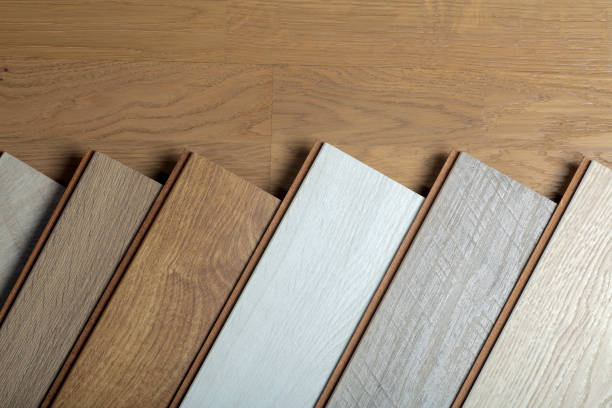
Epoxy is a durable and high-performance coating that provides a seamless and non-porous surface, making it resistant to spills, stains, and chemicals. Here are some types of commercial epoxy flooring that offer non-slip properties:
Epoxy Coatings with Anti-Slip Additives: These epoxy coatings have specific additives mixed in to create a textured surface that enhances traction. Common additives include silica sand, aluminum oxide, or polymer grit. The degree of slip resistance can be customized based on the size and concentration of the additives.
Epoxy with Broadcasted Flakes: This type of epoxy flooring involves applying a base coat of epoxy and then broadcasting colored vinyl flakes onto the surface. After the flakes are embedded, a topcoat of clear epoxy is applied. The flakes not only add aesthetic appeal but also create a textured surface that improves slip resistance.
Quartz-Filled Epoxy Flooring: Quartz-filled epoxy is a type of epoxy flooring that incorporates quartz sand or aggregates into the coating. The quartz particles provide a textured surface that enhances slip resistance while still maintaining the durability and chemical resistance of epoxy.
Urethane Mortar Epoxy Flooring: Urethane mortar epoxy is a heavy-duty flooring system that combines epoxy resin with urethane mortar. This type of flooring offers exceptional durability, chemical resistance, and non-slip properties. It is commonly used in commercial kitchens where heavy equipment, hot oils, and harsh chemicals are present.
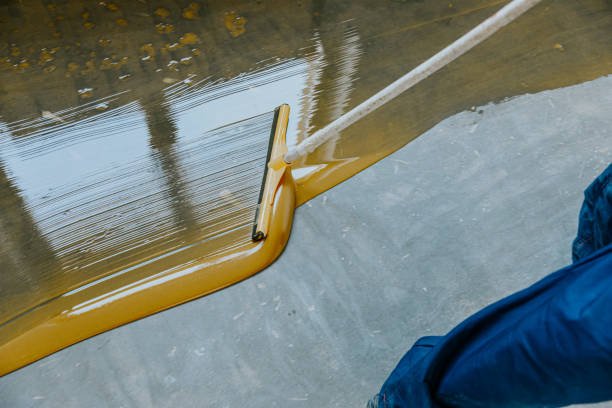
After understanding the above five types of non slip commercial kitchen floor tiles , if you're interested in learning more about ceramic tile flooring or would like to discuss them further, please feel free to contact us directly. We would be happy to provide you with additional information and address any questions or concerns you may have regarding ceramic floor tiles for commercial kitchen applications.
It is important to consider the maintenance requirements and durability of the non slip floor tiles before installation to ensure long-term effectiveness and safety in a commercial kitchen environment. The following are some other considerations to keep in mind before installing non slip floor tiles:
Proper surface preparation is essential for the effective installation of non slip floor tiles. The subfloor must be thoroughly cleaned, leveled, and dried before installation. Any imperfections or irregularities in the subfloor can cause problems with the tile installation and reduce the effectiveness of the non slip surface.
Commercial kitchens are prone to moisture buildup, which can lead to mold, mildew, and other issues. It is important to choose non slip floor tiles that are resistant to moisture and can withstand the harsh conditions of a commercial kitchen. In addition, proper moisture control measures should be taken to prevent moisture buildup on the subfloor.
Non slip floor tiles should be tested for slip resistance before installation. This can help ensure that the tiles meet the required safety standards and provide adequate slip resistance in wet and greasy conditions.
The cost of non slip floor tiles can vary greatly depending on the type of tile, the size of the area, and other factors. It is important to conduct a cost analysis and determine a realistic budget before making any decisions. In addition, the installation timeline should be taken into consideration to minimize disruption to the kitchen's operations.
Overall, careful consideration of these factors can help ensure the long-term effectiveness and safety of non slip floor tiles in a commercial kitchen environment.
Involving employees in the decision-making process regarding non-slip floor tiles for a commercial kitchen can lead to improved safety outcomes. Staff engagement can be achieved through various means, including training sessions, safety drills, and communication strategies. These initiatives can not only increase awareness about safety protocols but can also encourage employees to provide feedback on existing safety measures.
Training sessions can help employees understand the importance of non-slip flooring and how it can contribute to a safer work environment. Safety drills can be used to test the effectiveness of safety protocols and identify areas that need improvement. Communication strategies, such as regular safety meetings or the use of safety posters, can also help reinforce safety protocols and keep employees informed about any changes or updates.
By involving employees in the decision-making process, they can feel empowered and invested in the safety of the workplace, leading to a more vigilant and safety-conscious team.
Compliance with health codes and safety regulations is crucial for maintaining a safe and hygienic working environment in any food service establishment. Slip resistant flooring is a vital part of maintaining a safe kitchen environment. A kitchen is a place that can be prone to accidents, and non-slip flooring can help prevent slips and falls. Slip-resistant tiles come in a variety of materials, including porcelain, ceramic, and quarry.
To ensure kitchen hygiene, it is vital to take necessary steps to prevent slips and falls. Here are four ways to maintain safety and meet health code compliance:
-Conduct regular inspections of the flooring and replace any damaged or worn-out tiles.
-Train employees on proper cleaning and maintenance of the flooring to prevent dirt and grime buildup.
-Place anti-fatigue mats in areas where employees stand for extended periods to reduce the risk of slips and falls.
-Ensure that proper footwear is worn by all employees to maintain a high level of safety in the kitchen.
By implementing these safety measures, food service establishments can ensure a safe and hygienic working environment for their employees, minimize the risk of accidents, and meet health code compliance.

A crucial step in selecting the most appropriate flooring products is to review customer ratings, which can provide valuable insights into the satisfaction levels of previous customers. By doing so, one can gain a better understanding of the customer experiences with different flooring products, and compare them with one another to make an informed decision. It is important to note that while customer ratings can be a useful tool in making a decision, they should not be the sole determining factor.
In addition to customer experiences, it is also important to consider other factors such as the installation process, maintenance tips, and scratch resistance of the non slip floor tiles for commercial kitchen. By taking all of these factors into account, one can make a decision that not only meets their needs, but also provides a high level of satisfaction over time. Ultimately, selecting the right non slip floor tiles for commercial kitchen can play a significant role in the overall safety and success of a business, making it well worth the effort to research and compare different options.
To properly install non slip floor tiles in a commercial kitchen, the first step is to thoroughly clean and prepare the subfloor to ensure a level and stable surface. This involves removing any debris, smoothing out any uneven areas, and filling in any cracks or gaps. Once the subfloor is prepped, the following steps can be taken:
- Tools needed: A trowel, a level, a measuring tape, a chalk line, a wet saw, and a rubber mallet.
- Preparation steps: Measure the area to be tiled and mark the center point. Snap a chalk line from the center point to the opposite walls to create a guide for tile placement. Apply adhesive to a small area of the subfloor and begin laying tiles along the chalk line, using spacers to ensure even spacing between tiles. Cut tiles to fit around obstacles using a wet saw.
- Adhesive application: Spread adhesive onto the subfloor using a trowel, working in small areas at a time. Apply enough adhesive to cover an area where several tiles will be placed.
- Tile placement: Place the first tile at the center point and press firmly into the adhesive. Continue to lay tiles along the chalk line, using spacers to ensure even spacing between tiles. Tap each tile gently with a rubber mallet to ensure a secure bond.
Once all tiles are in place, the grouting process can begin. Mix grout according to manufacturer instructions and spread over the tiles, filling in the gaps between them. Use a grout float to smooth the grout lines and wipe away any excess with a damp sponge. Allow the grout to dry completely before using the tiled area.
By following these steps, non slip floor tiles can be installed in a commercial kitchen safely and effectively.
Cleaning commercial kitchen tile flooring requires thoroughness and attention to detail to maintain a clean and hygienic environment. Here are the steps to effectively clean commercial kitchen tile flooring:
Prepare the area: Remove any movable furniture, equipment, or debris from the floor. Sweep or vacuum the area to eliminate loose dirt and debris.
Choose the right cleaning solution: Select a commercial-grade, non-acidic, and non-abrasive tile cleaner suitable for your specific tile type. Check the manufacturer's instructions for recommended cleaning products.
Dilute the cleaner: Follow the instructions on the cleaning solution bottle to determine the appropriate dilution ratio with water. Use a bucket or a sprayer to prepare the solution accordingly.
Pre-treat stains and high-traffic areas: If there are stubborn stains or heavily soiled areas, pre-treat them with the cleaner. Apply the solution directly to the stains and let it sit for a few minutes to loosen the dirt.
Scrub the floor: Use a scrub brush, mop, or a scrubbing machine with soft bristles to clean the tile surface. Start from one end of the floor and work your way to the other end. Scrub in small sections to ensure thorough cleaning.
Pay attention to grout lines: Grout lines are porous and can accumulate dirt and stains. Scrub the grout lines using a grout brush or an old toothbrush soaked in the cleaning solution. Focus on removing any grime or discoloration.
Rinse the floor: Once you have scrubbed the entire floor, thoroughly rinse it with clean water to remove any remaining cleaner residue. This step is crucial to prevent slips and falls.
Dry the floor: Use clean mops or towels to dry the floor. Ensure that it is completely dry before allowing foot traffic to prevent accidents and maintain cleanliness.
Periodic deep cleaning: In addition to regular maintenance, schedule periodic deep cleaning for your commercial kitchen tile flooring. This may involve using steam cleaners or hiring professional cleaning services to ensure a thorough and sanitizing clean.
Yes, commercial kitchen tiles can be scratch resistant, but it depends on the specific type of tile you choose. There are various options available in the market, each with different properties and levels of durability.
One common type of scratch-resistant tile used in commercial kitchens is porcelain tile. Porcelain tiles are known for their hardness and durability, making them less prone to scratches compared to other types of tiles. They are made from dense clay that is fired at high temperatures, resulting in a hard and dense material.
Another option is ceramic tile, which is also used in many commercial kitchen settings. While ceramic tiles are generally durable, their scratch resistance can vary depending on the specific glaze or finish applied to the tile surface. It's important to select ceramic tiles that are specifically designed for high-traffic areas and have a durable finish to minimize the risk of scratches.
In addition to the type of tile, the level of scratch resistance can also depend on the tile's surface texture. Smooth or polished tiles may be more susceptible to scratches compared to textured or matte tiles, as scratches tend to be more noticeable on smooth surfaces.
To ensure optimal scratch resistance, it is advisable to choose high-quality tiles from reputable manufacturers and consult with professionals who specialize in commercial kitchen installations. Proper maintenance and regular cleaning using appropriate methods and materials can also help preserve the tile's scratch-resistant properties.
Remember to conduct thorough research and consult with experts or suppliers to select the best scratch-resistant tiles for your specific commercial kitchen needs.
Non Slip Tile Blog Series:
Non Slip Ceramic Tile For Bathroom-10 Ideas And Guides
Porcelain Anti Slip Floor Tiles China
Anti Slip Porcelain Garden Tiles
Favorable Anti Slip Floor Tiles Price At Sunvin Ceramics
Anti Slip Floor Tiles for Wet Rooms
Non Slip Floor Tiles For Living Room
Anti Slip Ceramic Floor Tiles Commercial
Anti Slip Rating Tiles∣Your Essential Guide 2023
Anti Slip Floor Tiles For Kitchen
Anti Slip Floor Tiles Bathroom
In conclusion, ensuring the safety of commercial kitchen floors is crucial to prevent accidents and injuries.
Replacing old floors with non-slip tiles is a practical solution that can significantly improve safety.
When choosing non-slip floor tiles, it is important to consider the material, slip resistance, durability, and maintenance requirements. Additionally, factors such as the layout of the kitchen, the type of footwear worn by employees, and the frequency of cleaning should also be taken into account.
To make a commercial kitchen as safe as possible, owners and managers should implement strict safety protocols, provide appropriate training to employees, and regularly inspect and maintain the kitchen equipment and facilities.
By prioritizing safety and taking proactive measures, business owners can create a safe and healthy work environment for their employees and customers alike.
At Sunvin Ceramics, we take pride in delivering top-quality tiles that combine functionality with style. Our extensive experience in the industry has allowed us to refine our products to meet the highest standards of durability and safety.
When it comes to non-slip ceramic floor tiles, Sunvin Ceramics is your trusted partner. Contact us today to explore our exceptional range of tiles and experience the quality and professionalism that sets us apart from the rest. Let us help you transform your space into something extraordinary!